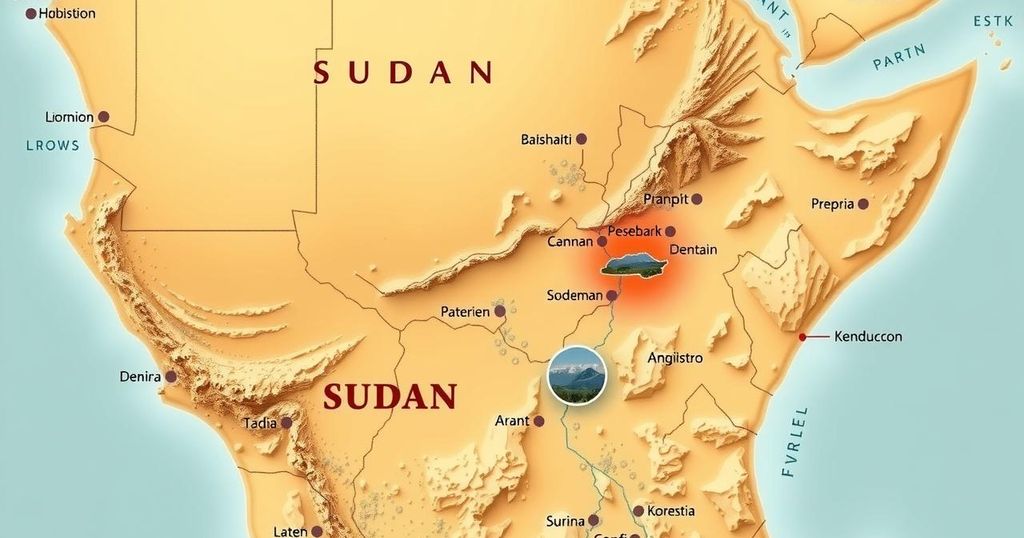The RSF’s formation of a rival government in Sudan exacerbates existing divisions and threatens territorial integrity, potentially leading to further partition. It reflects deeper fractures following the RSF’s split from the SAF after Sudan’s 2019 revolution and signifies escalating violence and humanitarian crises. International reactions include concerns about increased fragmentation, with calls for cohesive responses to avert worsening conditions.
On February 23, 2023, Sudan’s paramilitary Rapid Support Forces (RSF) proclaimed the establishment of a so-called ‘Government of Peace and Unity.’ This announcement comes amidst ongoing conflict and humanitarian crises in Sudan, which has faced severe famine and widespread displacement, leaving over 14 million people affected. The RSF’s claim not only escalates Sudan’s tumultuous political landscape but also heightens the threat to its territorial integrity, risking further de facto partition of the nation.
The declaration signifies the ongoing division within Sudan, notably following the RSF’s break from the Sudanese Armed Forces (SAF). The SAF had gained leadership after the 2019 revolution but has since lost power amidst rising violence with the RSF. The ensuing power struggle has jeopardized democratic progress and left civilians vulnerable, caught between these factions. The RSF formalized its separatist efforts through a charter in Nairobi, Kenya, indicating its intent to govern areas it controls, particularly in western Sudan.
Suliman Baldo, of the Sudan Transparency and Policy Tracker, expressed that this initiative would exacerbate Sudan’s existing territorial divide. The RSF’s charter aims for a secular and democratic state while also promoting a unified national military. Nonetheless, observers contend that this strategy is a façade to mitigate the RSF’s tarnished reputation, amidst accusations of committing war crimes and genocide.
Analysts caution against overly simplifying Sudan’s situation by comparing it to Libya’s ongoing conflict. Cameron Hudson from CSIS remarked that de facto partition already exists, with significant territories under RSF authority. Recent military advances by the SAF, particularly in Greater Khartoum, indicate a potentially decisive shift in control. This growing division could further destabilize the region and deepen the humanitarian crisis.
As for international reactions, concerns have been raised regarding the RSF’s new government exacerbating the fragmentation of Sudan. The United Nations and several Middle Eastern nations have denounced this move, fearing it disrupts progress toward peace. There are also accusations directed at Kenya for infringing Sudan’s sovereignty by hosting RSF meetings, while Kenya asserts its role in facilitating peace discussions.
Major global powers have expressed support for rival factions involved in the Sudanese conflict, with countries such as Iran, China, and Turkey supplying arms to the SAF. Simultaneously, Russia has aligned more with the SAF, possibly seeking strategic advantages, while links between the RSF and the UAE have emerged, sparking further controversies.
Cameron Hudson pointed out that recognition of the RSF government seems unlikely due to its territorial losses and egregious human rights violations. Ultimately, the RSF’s declaration serves to deepen political divisions within Sudan, entrenching existing territorial splits without altering the power dynamics favorably. If inaction from the international community continues, the de facto partition may solidify into a grim reality for Sudan’s future.
The announcement of a rival government by Sudan’s RSF amplifies existing divisions and raises significant concerns regarding the potential for an entrenched partition of the country. The international community’s apprehension regarding this development highlights the urgency needed for a cohesive response to Sudan’s escalating crisis. Without action, the humanitarian consequences may worsen, solidifying the fractures within Sudan’s governance structure and society.
Original Source: www.newarab.com






